一般疑问句及特殊疑问句总结(针对小学阶段学生)
一般疑问句和特殊疑问句完整版
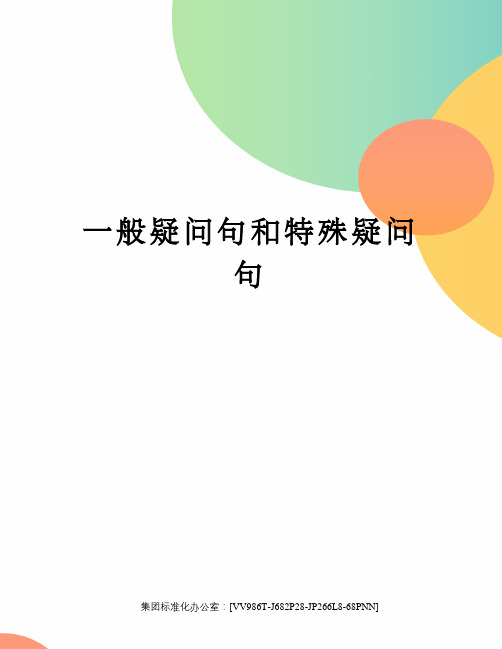
一般疑问句和特殊疑问句集团标准化办公室:[VV986T-J682P28-JP266L8-68PNN]一般疑问句与特殊疑问句Date:_______ name:_______一、【一般疑问句】1. 定义:用be、助动词或情态动词置于句首,并以“Yes,…”,或“No,…”或相当于yes / no回答的问句称为一般疑问句.2. 含系动词be的一般疑问句的构成:Be +主语+其它注意:am 只能跟在第一人称的单数 I 后面;are 搭配 you,不管you是单数还是复数;is 跟在第三人称单数 he, she, it后面Eg: I'm in Class 2, Grade 7.→ Are you in Class 2, Grade 7 (如遇第一人称,最好将其置换成第二人称)It's a map of China.→Is it a map of China这是一幅中国地图吗3. 含实义动词的一般疑问句的构成:Do/Does +主语 + 动词原形 + 其它注意:主语为第三人称单数,谓语动词为一般现在时单数第三人称形式"v-(e)s"时,用does,并要将谓语动词变回原形(如has→have,likes→like等);有时陈述句中的some还要变作any等。
如:Eg: She lives in Beijing. →Does she live in BeijingI like English. →Do you like EnglishThere are some books on my desk.→Are there any books on your desk4. 含情态动词的一般疑问句的构成:情态动词+主语+动词原形+其它Eg: I can spell it. →Can you spell it?I will do that for her. →Will you do that for her?She can drive. →Can she drive5. 一般疑问句的应答动词保持一致。
小学英语一般疑问句和特殊疑问句附练习题
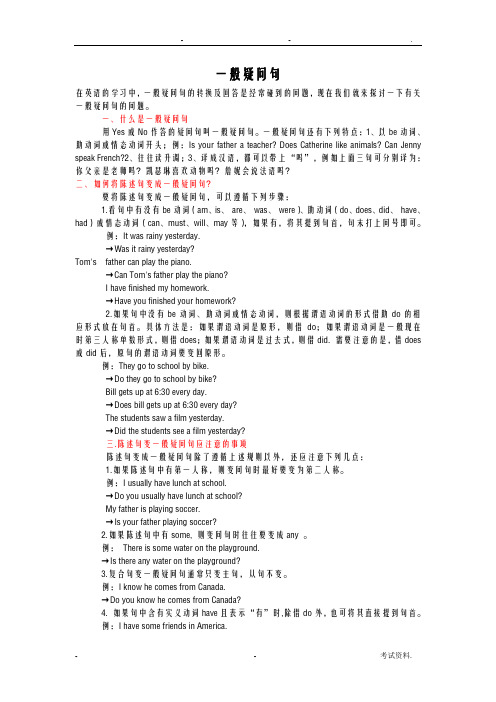
一般疑问句在英语的学习中,一般疑问句的转换及回答是经常碰到的问题,现在我们就来探讨一下有关一般疑问句的问题。
一、什么是一般疑问句用Yes或No作答的疑问句叫一般疑问句。
一般疑问句还有下列特点:1、以be动词、助动词或情态动词开头;例:Is your father a teacher? Does Catherine like animals? Can Jenny speak French?2、往往读升调;3、译成汉语,都可以带上“吗”,例如上面三句可分别译为:你父亲是老师吗?凯瑟琳喜欢动物吗?詹妮会说法语吗?二、如何将陈述句变成一般疑问句?要将陈述句变成一般疑问句,可以遵循下列步骤:1.看句中有没有be动词(am、is、are、was、were)、助动词(do、does、did、have、had)或情态动词(can、must、will、may等),如果有,将其提到句首,句末打上问号即可。
例:It was rainy yesterday.→Was it rainy yesterday?Tom's father can play the piano.→Can Tom's father play the piano?I have finished my homework.→Have you finished your homework?2.如果句中没有be动词、助动词或情态动词,则根据谓语动词的形式借助do的相应形式放在句首。
具体方法是:如果谓语动词是原形,则借do;如果谓语动词是一般现在时第三人称单数形式,则借does;如果谓语动词是过去式,则借did. 需要注意的是,借does 或did后,原句的谓语动词要变回原形。
例:They go to school by bike.→Do they go to school by bike?Bill gets up at 6:30 every day.→Does bill gets up at 6:30 every day?The students saw a film yesterday.→Did the students see a film yesterday?三.陈述句变一般疑问句应注意的事项陈述句变成一般疑问句除了遵循上述规则以外,还应注意下列几点:1.如果陈述句中有第一人称,则变问句时最好要变为第二人称。
小学中常见的疑问句与反意疑问句解析
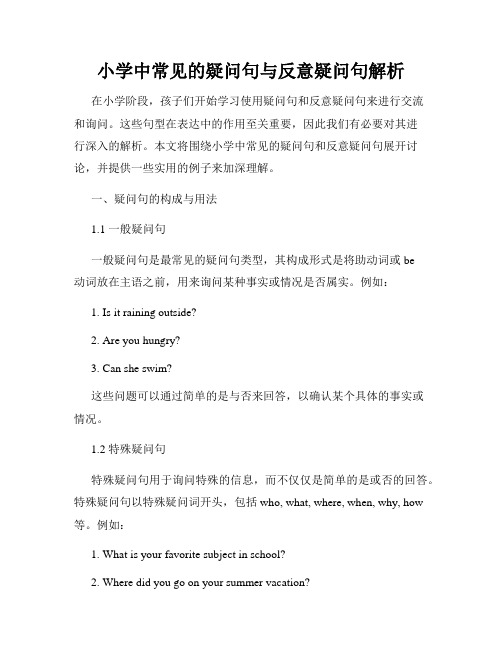
小学中常见的疑问句与反意疑问句解析在小学阶段,孩子们开始学习使用疑问句和反意疑问句来进行交流和询问。
这些句型在表达中的作用至关重要,因此我们有必要对其进行深入的解析。
本文将围绕小学中常见的疑问句和反意疑问句展开讨论,并提供一些实用的例子来加深理解。
一、疑问句的构成与用法1.1 一般疑问句一般疑问句是最常见的疑问句类型,其构成形式是将助动词或be动词放在主语之前,用来询问某种事实或情况是否属实。
例如:1. Is it raining outside?2. Are you hungry?3. Can she swim?这些问题可以通过简单的是与否来回答,以确认某个具体的事实或情况。
1.2 特殊疑问句特殊疑问句用于询问特殊的信息,而不仅仅是简单的是或否的回答。
特殊疑问句以特殊疑问词开头,包括who, what, where, when, why, how 等。
例如:1. What is your favorite subject in school?2. Where did you go on your summer vacation?3. How do you play this game?4. When is your birthday?这些问题需要提供更详细和具体的答案来回应,以满足对信息的需求。
二、反意疑问句的构成与用法反意疑问句用于在陈述句后面加上一个短疑问句,以确认陈述的内容或表达说话人的期望。
反意疑问句的构成形式是将陈述句中的动词变为否定形式,并在句尾加上与陈述句相反的短询问句。
例如:1. You don't like ice cream, do you?2. He will come to the party, won't he?3. She can swim, can't she?反意疑问句的目的是确认说话人的陈述是否正确,并期望对方给出肯定或否定的回答。
三、实例分析为了更好地理解疑问句和反意疑问句的使用方式,以下是一些常见的示例。
小学一般疑问句和特殊疑问句和Be动词一般过去时讲解及练习

一般疑问句用yes或no回答的疑问句,称为一般疑问句,这种疑问句句末语调多用升调,句末用问号“”句型:Be动词+ 主语+ ......?●A: Am I wrong again? (我又错了)B: Yes, you are (wrong again). (是的,你又错了。
B: No, you aren’t. (不,你没错。
)●A: Is it your bicycle? (这辆自行车是你的吗)B: Yes, it is. (是的,是我的。
)B: No, it isn’t. (不,那不是我的。
)●A: Are you a student? (你是学生吗)B:Yes, I am. (是的,我是。
)B: No, I’m not. / No, I am not. (不,我不是。
)●A: Is there any drinks in the fridge?B: Yes, there is. (是的,有。
)B: No, there isn’t. (不,没有。
)●A: Are there any birds in the sky? (天空中有鸟吗)B: Yes, there are. (是的,有。
)B: No, there aren’t. (不,没有。
)陈述句中有情态动词时,可以直接将它们提前到主语前,构成一般疑问句。
句型:情态动词+ 主语+ 动词原形+ ......?●A: Can you bring me some cakes? (你能给我拿些蛋糕来吗)B: Yes, I can. (是的,可以。
)B: No, I can’t. / No, I cannot. (不,不可以。
)●A: Must I do it now? (我必须现在做吗)B: Yes, you must. (是的,你必须。
)B: No, you needn’t. (不,你不必。
)(1)情态动词表示请求Can/Could you carry the heavy box for me? (你能帮我提一下这个重箱子吗)Will/Would you please give me some butter? (你能给我一些黄油吗)May I have some rice? (我可以吃一些米饭吗)(2)情态动词表示邀请、建议Will you visit the museum next week? (你下周来参观博物馆好吗)Would you like to go shopping with us? (你愿意和我们一起逛街购物吗)Shall we go swimming? (我们一起去游泳好吗)陈述句中只有行为动词时,一般疑问句要在句首加助动词do / does / did(过去式)句型:Do/Does/Did + 主语+ 动词原形+ ......?●A: Does he have supper at home every day?(他每天都在家吃晚饭吗)B: Yes, he does. (是的,他是。
小学英语语法详解疑问句--一般疑问句、特殊疑问句
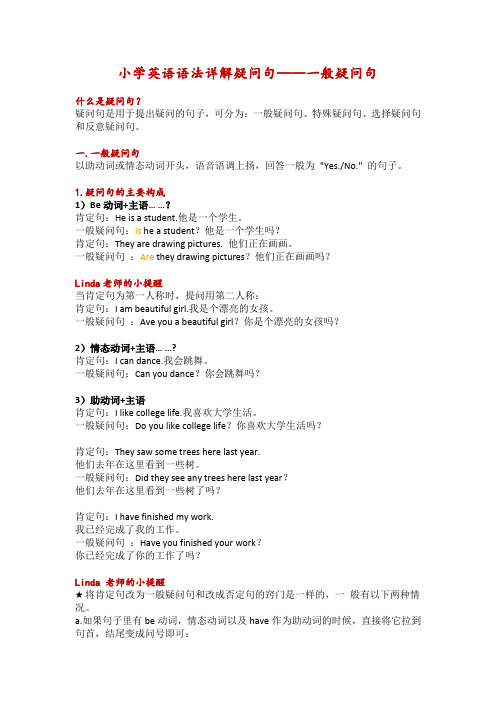
小学英语语法详解疑问句——一般疑问句什么是疑问句?疑问句是用于提出疑问的句子,可分为:一般疑问句、特殊疑问句、选择疑问句和反意疑问句。
一.一般疑问句以助动词或情态动词开头,语音语调上扬,回答一般为"Yes./No." 的句子。
1.疑问句的主要构成1)Be动词+主语… …?肯定句:He is a student.他是一个学生。
一般疑问句:Is he a student?他是一个学生吗?肯定句:They are drawing pictures. 他们正在画画。
一般疑问句:Are they drawing pictures?他们正在画画吗?Linda老师的小提醒当肯定句为第一人称时,提问用第二人称:肯定句:I am beautiful girl.我是个漂亮的女孩。
一般疑问句:Ave you a beautiful girl?你是个漂亮的女孩吗?2)情态动词+主语… …?肯定句:I can dance.我会跳舞。
一般疑问句:Can you dance?你会跳舞吗?3)助动词+主语肯定句:I like college life.我喜欢大学生活。
一般疑问句:Do you like college life?你喜欢大学生活吗?肯定句:They saw some trees here last year.他们去年在这里看到一些树。
一般疑问句:Did they see any trees here last year?他们去年在这里看到一些树了吗?肯定句:I have finished my work.我已经完成了我的工作。
一般疑问句:Have you finished your work?你已经完成了你的工作了吗?Linda 老师的小提醒★将肯定句改为一般疑问句和改成否定句的窍门是一样的,一般有以下两种情况。
a.如果句子里有be动词,情态动词以及have作为助动词的时候,直接将它拉到句首,结尾变成问号即可:He is twelve.→ Is he twelve?She can swim.→ Can she swim?I have got it.→ Have you got it?b.当句子里是实义动词时,我们也可以用一些小窍门:肯定句:I go to the park.我去公园。
小学英语句型转换(陈述句变一般疑问句特殊疑问句及练习)
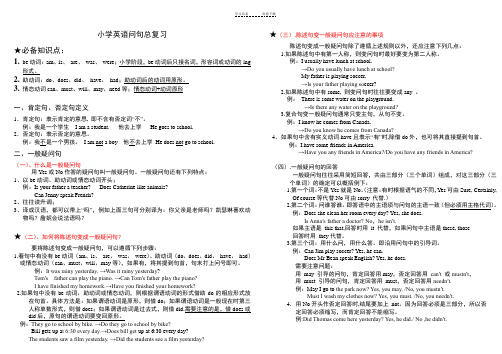
小学英语问句总复习★必备知识点:1.be动词:am、is、are、was、were;小学阶段,be动词后只接名词,形容词或动词的ing形式。
2.助动词:do、does、did、have、had;助动词后的动词用原形。
3.情态动词can、must、will、may、need等;情态动词+动词原形一、肯定句、否定句定义1.肯定句:表示肯定的意思, 即不含有否定词“不”。
例:我是一个学生I am a student. 他去上学He goes to school.2.否定句:表示否定的意思。
例:我不是一个男孩。
I am not a boy 他不去上学He does not go to school.二、一般疑问句(一)、什么是一般疑问句用Yes或No作答的疑问句叫一般疑问句。
一般疑问句还有下列特点:1、以be动词、助动词或情态动词开头;例:Is your father a teacher? Does Catherine like animals?Can Jenny speak French?2、往往读升调;3、译成汉语,都可以带上“吗”,例如上面三句可分别译为:你父亲是老师吗?凯瑟琳喜欢动物吗?詹妮会说法语吗?★(二)、如何将陈述句变成一般疑问句?要将陈述句变成一般疑问句,可以遵循下列步骤:1.看句中有没有be动词(am、is、are、was、were)、助动词(do、does、did、have、had)或情态动词(can、must、will、may等),如果有,将其提到句首,句末打上问号即可。
例:It was rainy yesterday. →Was it rainy yesterday?Tom's father can play the piano. →Can Tom's father play the piano?I have finished my homework.→Have you finished your homework?2.如果句中没有be动词、助动词或情态动词,则根据谓语动词的形式借助do的相应形式放在句首。
【免费】小学三年级英语语法:一般疑问句及特殊疑问句
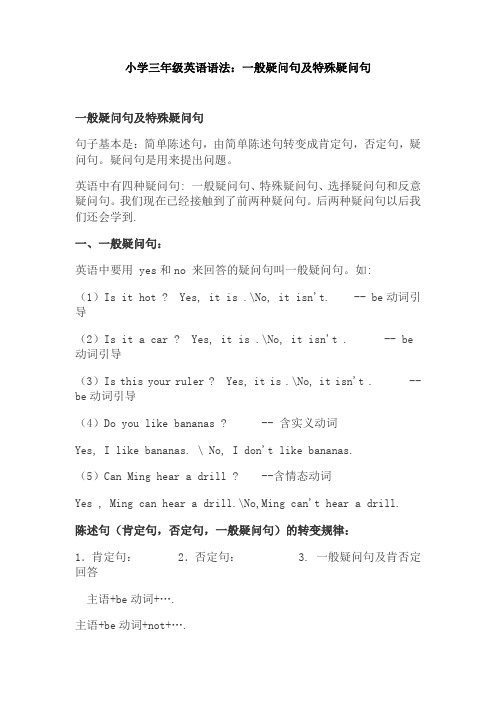
小学三年级英语语法:一般疑问句及特殊疑问句一般疑问句及特殊疑问句句子基本是:简单陈述句,由简单陈述句转变成肯定句,否定句,疑问句。
疑问句是用来提出问题。
英语中有四种疑问句: 一般疑问句、特殊疑问句、选择疑问句和反意疑问句。
我们现在已经接触到了前两种疑问句。
后两种疑问句以后我们还会学到.一、一般疑问句:英语中要用 yes和no 来回答的疑问句叫一般疑问句。
如:(1)Is it hot ? Yes, it is .\No, it isn't. -- be动词引导(2)Is it a car ? Yes, it is .\No, it isn't . -- be动词引导(3)Is this your ruler ? Yes, it is .\No, it isn't . -- be动词引导(4)Do you like bananas ? -- 含实义动词Yes, I like bananas. \ No, I don't like bananas.(5)Can Ming hear a drill ? --含情态动词Yes , Ming can hear a drill.\No,Ming can't hear a drill.陈述句(肯定句,否定句,一般疑问句)的转变规律:1.肯定句: 2.否定句: 3. 一般疑问句及肯否定回答主语+be动词+….主语+be动词+not+….be动词+主语+…?Yes, 主语+be动词./No, 主语+be动词+not.I am a teacher. I am not a teacher. Are you a teacher?--Yes, I am./ No, I am not.My mother is thin. My mother is not /isn'tthin. Is your mother thin?--Yes, she is./ No, she isn't.They are insects. They are not/aren't insects. Are they insects?--Yes. they are./ No, they aren't.主语+情态动词can+…主语+情态动词can+ not+….情态动词can+主语+…?Yes, 主语+情态动词can/No,主语+情态动词can+ notHe can jump. Hecan not/can't jump. Can he jump?--Yes,he can./ No, he can't.主语+动词+….主语+助动词do/does+not助动词do/does+主语+…. 动词原形 +….动词原形?Yes, 主语+助动词do/does.No, 主语+助动词do/does+not.He likes to eat apples. He doesn't like to eat apples. Does he like to eat apples?Yes,he does./ No,he doesn't.We like to eat apples. We don't like to eat apples. Do you like to eat apples?Yes,we do. /No,we don't.二、祈使句:表示请求、命令、建议或劝告等的句子叫祈使句,主语you常省略。
特殊疑问句和一般疑问句的用法
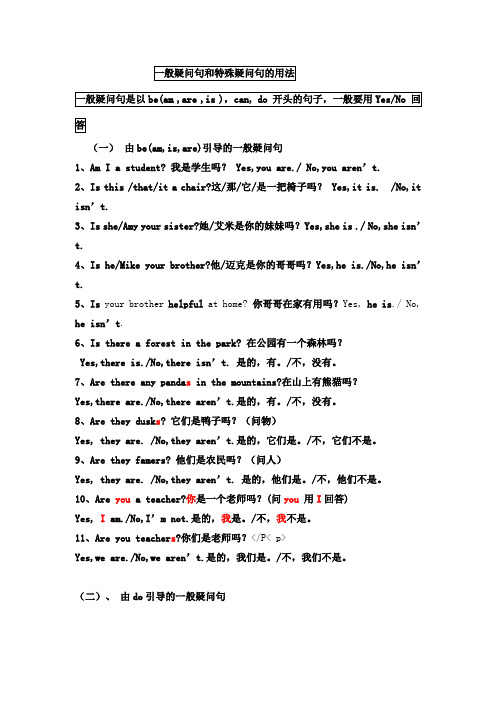
(一)由be(am,is,are)引导的一般疑问句1、Am I a student? 我是学生吗? Yes,you are./ No,you aren’t.2、Is this /that/it a chair?这/那/它/是一把椅子吗? Yes,it is. /No,it isn’t.3、Is she/Amy your sister?她/艾米是你的妹妹吗?Yes,she is ./ No,she isn’t.4、Is he/Mike your brother?他/迈克是你的哥哥吗?Yes,he is./No,he isn’t.5、Is your brother helpful at home? 你哥哥在家有用吗?Yes, he is./ No, he isn’t.6、Is there a forest in the park? 在公园有一个森林吗?Yes,there is./No,there isn’t. 是的,有。
/不,没有。
7、Are there any panda s in the mountains?在山上有熊猫吗?Yes,there are./No,there aren’t.是的,有。
/不,没有。
8、Are they dusk s? 它们是鸭子吗?(问物)Yes, they are. /No,they aren’t.是的,它们是。
/不,它们不是。
9、Are they famers? 他们是农民吗?(问人)Yes, they are. /No,they aren’t. 是的,他们是。
/不,他们不是。
10、Are you a teacher?你是一个老师吗?(问you 用I回答)Yes, I am./No,I’m not.是的,我是。
/不,我不是。
11、Are you teacher s?你们是老师吗?</P< p>Yes,we are./No,we aren’t.是的,我们是。
- 1、下载文档前请自行甄别文档内容的完整性,平台不提供额外的编辑、内容补充、找答案等附加服务。
- 2、"仅部分预览"的文档,不可在线预览部分如存在完整性等问题,可反馈申请退款(可完整预览的文档不适用该条件!)。
- 3、如文档侵犯您的权益,请联系客服反馈,我们会尽快为您处理(人工客服工作时间:9:00-18:30)。
一般疑问句及特殊疑问句总结(针对小学阶段学生)第一篇:一般疑问句及特殊疑问句总结(针对小学阶段学生) 一般疑问句及特殊疑问句的总结一般疑问句的定义:用yes或no来回答的疑问句叫一般疑问句。
一般疑问句的三种常见形式:1.be动词+主语+其他?(be动词有am is are)Are you a student?Are they happy?Are the books on the shelf?Is she a beautiful girl?Is he a good boy?Are there any books in the bag? Is there any juice in the cup?2.情态动词+主语+其他?(情态动词有can may must)Can he balance on the ball?Can they play basketball?Must he eat breakfast at six o'clock?May I borrow your book?3.助动词+主语+其他?(助动词有do does did)Do you play soccer on weekend?Do they live in Beijing?Does he/she go to the park on Thursday?附加:最近他们学的have got 固定词组“有”相关的一般疑问句是Have they got any orange juice in the fridge?肯定回答是yes, they have.否定回答是no, they haven't.所有一般疑问句的肯定回答都是:yes,主语+句子开头的词(助动词,情态动词,be动词)特殊疑问句的定义:有5个W和一个H(who whose which what where+how)这六个疑问词引导的的疑问句叫特殊疑问句。
特殊疑问句的句型结构是:特殊疑问词+(be动词,情态动词,助动词)+主语+其他?第二篇:中学英语特殊疑问句1.2.3.4.5.6.7.8.9.10.11.12.13.14.15.16.17.18.19.20.21.22.23.24.25.26.27.28.29.30.31.32.33.34.35.36.What subject do you like? Ilike English/Chinese/Math/history etc.What school are you in? I am in NO.6 middle school.What’s your favorite subject? My favorite subject is English.What animal do you like? I like dogs/cats/sheep etc.What sport can you do? I can play basketball/football/badminton/volleyball etc.How mangy people are there in your family? There are four people in my family.How do you go to school? I go to school on foot/by car/by bus etc.How many English lessons do you have a week? I have 6 English lessons a week.What do you usually do after school? I usually do my homework, watch TV, play computer games after school.When do you go to bed every day? I go to bed at 9 o’clock.What do you do before sleep? I read books before slee p.When’s your birthday? My birthday is on June the 19th.How many months are there in a year? There are 12 months in a year.What’s your favorite holiday? My favorite holiday is summer holiday.How many seasons are there in a year? There are 4 seasons in a year.What season do you like best? I like summer best.What do American children do on Christmas? They will go shopping and buy lots of gifts and decorate their houses.What do you usually do at the weekends? I usually do my homework and play games with my fri ends.What do you do on Children’s day? I play games with my friends and have a big dinner with my parents.What present do you want to get on Children’s Day? I want to get an English dictionary on Children’s Day.What’s your father’s job? My father is an off icer.Where is your home? My home is in Macao.Which floor do you live? I live on the second floor.What do you usually buy when you go to supermarket? I usually buy some delicious food and fruit.Withwhom you often play table tennis? I often play table tennis with my father.What do you like doing at the PE lessons? I like playing football and basketball.What do you usually do after lunch? I usually have a sleep after lunch.What food do you like? I like KFC.What time do you usually go to school? I usually go to school at 7:00.How does your father go to work? He goes to work by car.What will you do when you grow up? I want to be an English teacher when I grow up.What will you do if you have 5,000,000 yuan? I want to travel around the world and buy a villa in the countryside.Which do you prefer, country life or city life? I like country life because it is more comfortable.What’s the motto of Olympic? Faster, higher, stronger.What’s Hangzhou famous for? West Lake.Which country do you want to go first if you have a lot of money? I want to go to Canada.第三篇:反义疑问句特殊用法总结1.当陈述部分的主语是I,而句子又用来征询对方的意见时,附加疑问句中的主语用you。
如:I find English very interesting, don’t you? I don’t like that film, do you? 2.当陈述部分的主语是everybody, everyone, someone, nobody, no one, somebody, anybody, anyone, none, neither等合成代词时,附加疑问句中的主语通常用they。
但亦可用he,尤其是nobody, no one等作主语,具有否定概念时。
如:Everyone is here, aren’t they? No one knows about it, do they? Somebody phoned while I was out, didn’t they? Everyone enjoyed the party, didn’t they? Nobody wants to go there, does he? 3.当陈述部分的主语是不定代词everything, nothing, anything, something时,反意疑问句中的主语一般用it,不用they。
如:Everything seems all right now, doesn’t it? Nothing is kept in good order, is it? Something must be done to stop pollution,isn’t it? Something is wrong with my rad io, isn't it? 4.当陈述部分的主语是指示代词this, that或these, those时,附加疑问句中的主语分别用it和they。
如:This is important, isn’t it? That isn’t correct, is it? This is a plane, isn't it? These are grapes,aren't they?These are your friends Tom and Jack, aren’t they? 5.如果陈述部分是以代词one作主语,附加疑问句中的主语在正式场合用one,非正式场合用you,在美国英语中,在非正式场合还可以用he。
